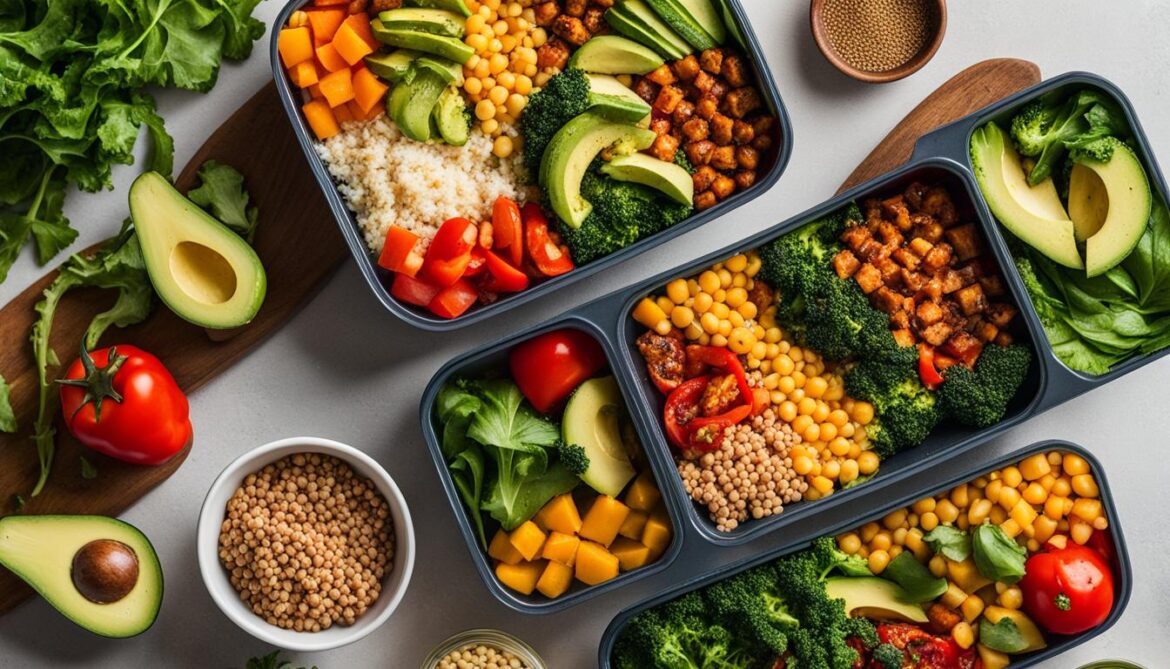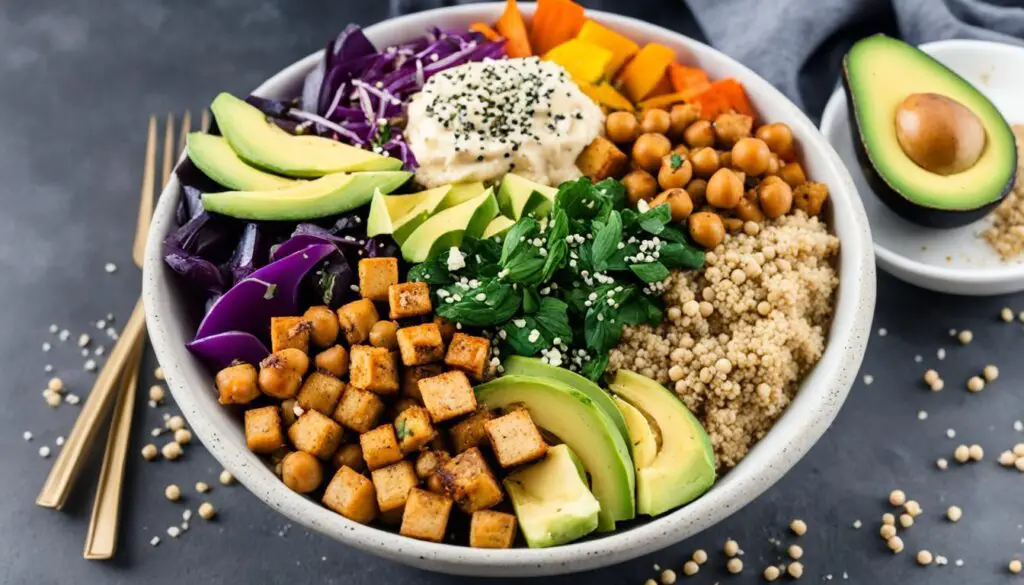I believe that planning your meals in advance is essential for achieving your fitness goals. As someone who follows a high-protein vegetarian diet, I understand the importance of preparing nutritious and protein-rich meals to support my workouts and sustain my energy levels throughout the day.
By investing time in vegetarian meal prep, you can ensure that you have the fuel you need to power your fitness journey. Whether your goal is to build muscle, lose weight, or maintain a healthy lifestyle, a high-protein vegetarian meal plan can provide the necessary nutrients for optimal performance and recovery.
Key Takeaways:
- Planning meals in advance is crucial for achieving fitness goals on a high-protein vegetarian diet.
- Vegetarian meal prep ensures you have nutritious and protein-rich meals readily available.
- A high-protein vegetarian meal plan supports muscle building, weight loss, and overall health.
- By investing in meal prep, you save time and effort during busy weekdays.
- With proper meal planning, you can maintain sustainable nutrition for a healthier lifestyle.
Why Choose a High-Protein Vegetarian Diet?
A high-protein vegetarian diet offers a multitude of health benefits. Not only does it provide all the essential amino acids your body needs for optimal function, but it also offers a wide array of fibers, vitamins, and minerals. By making conscious choices and incorporating plant-based protein sources into your meals, you can confidently meet your protein needs while enjoying a variety of delicious and nutritious foods.
The Benefits of a High-Protein Vegetarian Diet
Opting for a high-protein vegetarian diet allows you to embrace a sustainable and compassionate way of eating while reaping the benefits of a protein-rich lifestyle. Here are some key advantages of choosing this dietary approach:
- Complete Amino Acid Profile: Contrary to common misconception, plant-based protein sources can provide all the essential amino acids needed for bodily functions. By combining different plant proteins throughout the day, such as legumes, tofu, tempeh, quinoa, and lentils, you can easily obtain a complete amino acid profile.
- Fiber-Rich: Vegetarian diets naturally promote higher fiber intake due to the abundance of plant-based foods. This can support digestive health, aid in weight management, and lower the risk of certain chronic diseases like heart disease and type 2 diabetes.
- Rich in Nutrients: Plant-based protein sources offer more than just protein. They are also packed with essential vitamins and minerals like iron, calcium, magnesium, and vitamin B12. Incorporating a variety of these foods into your diet ensures you receive a wide range of nutrients necessary for overall well-being.
- Eco-Friendly: Choosing a high-protein vegetarian diet contributes to sustainability efforts by reducing greenhouse gas emissions, conserving water resources, and minimizing deforestation. By opting for plant-based protein sources, you actively participate in promoting a healthier planet.
Plant-Based Protein Sources
When following a high-protein vegetarian diet, it’s important to include a variety of plant-based protein sources in your meals. Here are some nutrient-dense options:
- Legumes (e.g., beans, lentils, chickpeas)
- Tofu and tempeh
- Quinoa
- Nuts and seeds
- Whole grains (e.g., brown rice, oats)
- Dairy alternatives (e.g., soy milk)
- Eggs
- Plant-based protein powders (e.g., pea, hemp, rice)
These plant-based protein sources not only offer substantial amounts of protein but also provide essential nutrients. Incorporating a variety of these foods into your meals will ensure you meet your protein needs while enjoying a diverse and flavorful diet.
The Importance of Meal Planning
When it comes to sticking to a high-protein vegetarian diet, meal planning is crucial. By setting aside time each week to plan and prepare your meals, you can save time and effort during busy weekdays. Not only does meal planning ensure that you have nutritious and protein-rich meals ready to go, but it also helps you stay on track with your fitness goals.
Why is meal planning so important?
Meal planning helps you stay organized and enables you to make healthier choices by preemptively deciding what to eat throughout the week. It eliminates the need for last-minute, unhealthy food decisions when you’re crunched for time. By having a well-thought-out meal plan in place, you can avoid relying on processed foods or takeout options that may not align with your dietary goals.
Time-saving strategies
1. Batch cooking: Prepare large batches of staple items such as grains, legumes, and roasted vegetables in advance. This allows you to easily mix and match ingredients for diverse, protein-packed meals.
2. Portioning out meals for the week: Divide your prepared meals into individual containers, making it convenient to grab a well-balanced meal when you’re short on time.
3. Prepping ingredients in advance: Wash, chop, and pre-cook ingredients like vegetables and tofu to streamline your meal preparation process.
These time-saving strategies not only make your meal prep more efficient, but they also ensure that you have wholesome meals readily available. By investing a little time upfront to plan and prepare, you can enjoy the benefits of hassle-free mealtime and make healthier choices effortlessly.
With meal planning, you have full control over your diet and can tailor it to your specific needs. Whether you’re looking to lose weight, gain muscle, or simply maintain a healthy lifestyle, having a well-structured meal plan will help you achieve your goals more effectively. It eliminates guesswork, prevents impulse eating, and ensures that your high-protein vegetarian meals are both satisfying and nourishing.
By incorporating meal planning into your routine, you’ll find that it becomes easier to prioritize your health and fitness goals. It’s a time-saving strategy that sets you up for success and supports long-term adherence to your dietary choices.
High-Protein Vegetarian Meal Prep Ideas
When it comes to high-protein vegetarian meal prep, there’s no shortage of delicious and protein-packed recipes to fuel your body. Whether you’re a tofu fan or prefer legumes and grains, here are some creative meal prep ideas to keep your taste buds happy and your protein intake on point.
1. Chickpea Curry
Curries are not only flavorful but also a great way to incorporate protein-rich ingredients into your meal prep. Prepare a hearty chickpea curry packed with aromatic spices like cumin, turmeric, and coriander. Serve it with brown rice or quinoa for a complete and satisfying meal.
2. Black Bean and Quinoa Salad
For a refreshing and protein-packed dish, try a black bean and quinoa salad. Mix cooked quinoa, black beans, diced tomatoes, bell peppers, and fresh cilantro for a nutritious medley. Drizzle with a zesty lime dressing to enhance the flavors.
3. Tofu Stir-Fry
Tofu is a versatile protein source that can be used in a variety of vegetarian meal prep recipes. Create a flavorful tofu stir-fry by sautéing tofu cubes with mixed vegetables like broccoli, bell peppers, and snow peas. Season with soy sauce, ginger, and garlic for a savory and satisfying dish.
4. Lentil Soup
Lentils are rich in protein and make a comforting base for a hearty soup. Prepare a batch of lentil soup using red or green lentils, carrots, celery, onions, and vegetable broth. Season with herbs and spices like thyme and cumin for a flavorful and nutritious soup that can be enjoyed throughout the week.
5. Veggie-Packed Omelets
Start your day with a protein-packed vegetarian omelet prepared in advance. Whisk together eggs or plant-based alternatives like tofu, and add a variety of vegetables like spinach, mushrooms, onions, and bell peppers. Bake in a muffin tin or a casserole dish for an easy and portable breakfast option.
With these high-protein vegetarian meal prep ideas, you can look forward to delicious and nutritious meals that support your fitness goals. By preparing these recipes in advance and storing them in meal prep containers, you’ll have protein-packed meals ready to go whenever you need them.
Stay tuned for more meal prep tips and protein-packed recipes in the upcoming sections.
Tips for Successful High-Protein Vegetarian Meal Prep
In order to ensure the success of your high-protein vegetarian meal prep, it is important to keep in mind a few key tips. These tips will not only save you time and effort but also help you maintain the quality and nutrition of your meals.
Invest in Quality Meal Prep Containers
Investing in high-quality meal prep containers is essential for storing your meals effectively. Look for containers that are leak-proof, microwave-safe, and freezer-friendly. These containers will help keep your meals fresh and prevent any cross-contamination.
Use Labels to Keep Track
Labels can be incredibly helpful when it comes to organizing and keeping track of your meal preps. Label each container with the contents and the date of preparation. This will help you easily identify the meals and ensure that you consume them within their recommended shelf life.
Rotate Your Meals
Rotating your meals is a great way to avoid food waste and ensure that you are consuming a variety of nutrients. Plan your meals in a way that allows you to consume the older prepped meals before moving on to the newer ones. This will help maintain the freshness of your meals and prevent any spoilage.
Stock Your Kitchen with Essentials
Having a well-stocked kitchen is crucial for successful high-protein vegetarian meal prep. Make sure to have a variety of essential ingredients such as spices, herbs, and a range of plant-based protein sources like lentils, beans, tofu, and quinoa. These kitchen essentials will provide you with endless options and flavors when creating your protein-packed meals.
| Meal Prep Tips | Storage Tips | Kitchen Essentials |
|---|---|---|
| Invest in quality meal prep containers | Label containers with contents and dates | Stock up on spices, herbs, and plant-based protein sources |
| Rotate meals to avoid food waste | Ensure containers are leak-proof | Have a variety of grains, legumes, and tofu |
| Store meals in the freezer for longer shelf life | Keep a supply of fresh produce |
Boosting Protein Intake on a High-Protein Vegetarian Diet
While a high-protein vegetarian diet can provide ample protein, there may be times when you need an extra boost. Incorporating protein-rich snacks and supplements into your meal plan can help meet your protein needs, especially during intense workouts or when you’re on the go.
Protein-Rich Snacks
When hunger strikes between meals, reach for protein-rich snacks to keep you satisfied and nourished. Some delicious options include:
- Greek yogurt with nuts: Greek yogurt is not only a good source of protein but also high in calcium. Add some nuts for a crunchy and nutritious snack.
- Protein bars: Look for bars that are specifically formulated with plant-based proteins, such as soy, pea, or hemp protein. These bars are convenient and perfect for when you’re on the move.
- Edamame: These young soybeans are packed with protein and make an excellent snack. Enjoy them boiled, steamed, or even roasted for a crunchy texture.
Protein Supplementation
If you find it challenging to meet your protein needs through whole foods alone, protein supplementation can be a convenient option. Incorporating protein shakes or smoothies into your routine is an effective way to boost your protein intake. Try adding a scoop of plant-based protein powder, such as pea or rice protein, to your favorite smoothie recipe for a protein-packed treat.
Note: Prioritize whole foods as your main source of protein, and use supplements and snacks as a complement to your diet.
“Supplementing with protein snacks and shakes can be beneficial when you need an extra protein boost. However, it is important to remember that they should not replace a balanced diet consisting of a variety of plant-based protein sources.”
– Nutritionist Rebecca Johnson
| Food | Protein Content per Serving |
|---|---|
| Greek Yogurt (1 cup) | 23g |
| Protein Bar (1 bar) | 10-20g |
| Edamame (1 cup) | 17g |
| Plant-Based Protein Powder (1 scoop) | 15-25g |
Remember to consult with a healthcare professional or registered dietitian before incorporating any new supplements into your diet.
Conclusion
High-protein vegetarian meal prep is a game-changer when it comes to fueling your fitness goals. By taking the time to plan and prepare nutritious meals in advance, you can ensure that you have the sustenance you need to power through your workouts and support your body’s recovery. The benefits of this approach go far beyond fitness, as embracing a high-protein vegetarian diet also promotes sustainable nutrition for a healthier lifestyle.
Meal prepping allows you to stay on track with your fitness goals by providing you with a ready-made arsenal of protein-rich meals. Whether you choose legumes, tofu, or quinoa as your protein source, there are endless possibilities to create delicious and wholesome dishes. With a little creativity, you can enjoy flavorful recipes like chickpea curry or tofu stir-fry, all while meeting your nutritional needs.
Not only does high-protein vegetarian meal prep save you time and effort during busy weekdays, but it also ensures that you make mindful choices when it comes to sustainable nutrition. By investing in quality meal prep containers and stocking your kitchen with essential ingredients, you set yourself up for success. With each well-planned meal, you take a step closer to achieving your fitness goals and nourishing your body with wholesome, plant-based goodness.
FAQ
What are the benefits of a high-protein vegetarian diet?
A high-protein vegetarian diet provides all the essential amino acids your body needs, along with fiber, vitamins, and minerals.
How can meal planning help me stick to a high-protein vegetarian diet?
Meal planning allows you to save time and effort during busy weekdays by setting aside time each week to plan and prepare your meals.
What are some time-saving strategies for high-protein vegetarian meal prep?
Batch cooking, portioning out meals for the week, and prepping ingredients in advance are some time-saving strategies for high-protein vegetarian meal prep.
What are some protein-packed meal options for high-protein vegetarian meal prep?
Some protein-packed meal options include chickpea curry, black bean and quinoa salad, tofu stir-fry, lentil soup, and veggie-packed omelets.
How can I ensure the success of my high-protein vegetarian meal prep?
To ensure the success of your high-protein vegetarian meal prep, invest in quality meal prep containers, use labels to keep track of the contents and expiration dates, rotate your meals to avoid food waste, and stock your kitchen with essential ingredients.
What are some ways to boost protein intake on a high-protein vegetarian diet?
Consider incorporating protein-rich snacks like Greek yogurt with nuts, protein bars, and edamame into your meal plan. Protein supplementation through shakes or smoothies can also help meet your protein needs.



